#member of provincial parliament
Text

"Socialist Meetings Arranged. - Moses Bartly of Manchester, England will address a meeting under the auspices of the Socialist party of Canada, in the Colonial theatre, Main street, at 7.45 p. m. on Sunday evening. с. м. O'Brien, ex-M. P. P. for the Rocky Mountain division of Alberta, visits Winnipeg early next month and will address a series of meetings."
- from the Winnipeg Tribune. December 12, 1913. Page 6.
#manchester#winnipeg#socialist party of canada#member of provincial parliament#labor party#canadian socialism#socialist meeting#prairies socialism#working class politics
0 notes
Text
AUUC('s Edmonton Branch) released a statement on the Volunteer Nazi given a standing ovation in Canadian Parliament, read it

[x]
transcription after the cut
The Edmonton Branch of the Association of United Ukrainian Canadians (AUUC) condemns the honoring of a nazi Ukrainian World War II veteran, a member of the notorious 14th Waffen SS Division "Halychyna", in the House of Commons during the visit of Ukrainian President Zelenskiy last Friday, 22 September, 2023.
Our Association, founded in 1918 in Winnipeg as the Ukrainian Labor Temple Association, has an unblemished record of opposing fascism, in word and deed, before and after WWII, in Canada, in the Ukrainian-Canadian community, and abroad. Our members fought heroically in the Spanish Civil War, on the side of the Republican government, against fascism. They fought for Canada, allied with the Soviet Union, against nazi Germany and fascist Italy in WWII.
It is therefore unbelievable to us, as to most other Canadians, that when the individual in question, Yaroslav Hunka, was introduced in parliament as a Ukrainian veteran of WWII who fought against Russia, no one in attendance, all of whom gave him two standing ovations, realized what this meant. We know exactly what it meant.
Now this shameful spectacle has been publicized to all Canadians, and throughout the world. We welcome this publicization. We hope it will lead to a reckoning. Some steps in this direction have already been taken. The speaker of the House of Commons has resigned. An endowment in the name of Yaroslav Hunka at the Canadian Institute of Ukrainian Studies, at the University of Alberta, has been returned. We welcome these steps. But they are only first steps. Much more must be done. The problem is greater than simply one nazi, one speaker, and one endowment.
It is estimated that two thousand members of the 14th Waffen SS Division "Halychyna" were allowed into Canada after WWII. Our Association, immediately at that time, publicized and opposed their entry, to our everlasting credit. This figure does not include other nazis and nazi-collaborators, of various nationalities. That means thousands of Yaroslav Hunkas. Several of them went on to occupy prominent and leading positions in certain other Ukrainian-Canadian organizations, in religious institutions, educational institutions, and state institutions. The Canadian state supports, with funding and semi-official recognition, Ukrainian-Canadian organizations that unapologetically honor these nazis. If honoring Yaroslav Hunka in the House of Commons was a shameful act that had to be corrected, then so must all these other cases be corrected.
We therefore call on the Canadian state at all three levels (federal, provincial, municipal) to halt all state funding to all Ukrainian-Canadian organizations which honor any Ukrainian nazis or nazi-collaborators, including especially veterans of the 14th Waffen SS Division "Halychyna", until such time as these organizations explicitly and unequivocally apologize for having done so, severing all connections with all these nazis and nazi-collaborators, in all forms whatsoever.
We call for the removal and dismantling of two monuments to nazi Ukrainians in Edmonton: the monument to the veterans of the 14th Waffen SS Division "Halychyna" located in St. Michael's Cemetery, and the bust of Roman Shukhevych located at the Ukrainian Youth Unity Complex, preferably by their respective property owners, and if not by them, then by state compulsion.
We call on the government of Canada, and on the Liberal Party of Canada which formed the government at the time, to issue official apologies to our Association (the AUUC), in consultation with our Association, for banning it (then named the Ukrainian Labor-Farmer Temple Association) by an order in council in June 1940, seizing its properties, our halls and their contents (furniture, musical instruments, dance costumes, books, etc., most of which were destroyed), and interning our leaders in internment camps, acknowledging this as a terrible miscarriage of justice and act of oppression.
We call on all Canadians, all progressive Canadians, all decent Canadians, all anti-fascist Canadians, individually and through their various organizations, to support us in these calls for justice, by publicizing this statement, and pressuring their political representatives.
310 notes
·
View notes
Text
Hamilton Centre's independent member of provincial parliament (MPP) Sarah Jama says she will table motions at Queen's Park that would boost Ontario Works and Ontario Disability Support Program (ODSP) rates.
Jama told CBC Hamilton in an email she wants the housing allowance portion of both ODSP and Ontario Works to be calculated by and tied to the annual average market rent price of the city someone lives in.
She will also table a motion that would ensure ODSP benefits aren't reduced as a result of another household member's income. If someone gets married, for instance, or has a common-law partner and is on ODSP, they shouldn't see a decrease in benefits.
"I've heard disability benefits are just not enough to meet the soaring costs of rent in this province," Jama, who uses a wheelchair, said in a video posted to X on Tuesday.
Continue Reading
Tagging @politicsofcanada
#cdnpoli#canada#canadian politics#canadian news#ontario#sarah jama#disability#disability rights#disability advocacy#disability benefits
84 notes
·
View notes
Text
how to find & email your representative about Palestine (USA and Canada)
I have just been adding links to other posts about this situation, so I thought it might be helpful to make a separate post with all of the information I have.
If you are American, the following two links seem to be good resources. The first is a caard type website with multiple links, the second is a website that will help you find your representatives so you may email them directly:
If you are Canadian, you can use these two websites to find your provincial and federal reps (all you really need is your postal code) :
Emailing is great, but if you are able to calling is even better.
Not sure what to say? Just keep it simple, remind them that you are an average constituent and that you want them to demand ceasefire and aid to be allowed into the region. The first website I linked has a script at the bottom of the page that is a great starting point to write/speak from.
Remember that your representatives work for you, even if you did not vote for that particular person. They are there to voice your interests. I know it's difficult but just do your best to be calm and professional in your correspondence. And also remember you can contact them as many times as you want, if you think of something else you'd like to say send another email. Letting them know that this issue is important puts pressure on them to act, and action is what is needed most at this time.
If anyone has resources like this for other countries, please feel free to add them to this post.
And please do reblog/share!
38 notes
·
View notes
Text
Guy Fawkes and the Gunpowder Plot

By Ben Johnson
Published 30 October 2020
Remember, Remember, the 5th of November, Gunpowder, Treason and Plot!
Fireworks can be seen all over France every July 14 as the nation celebrates Bastille Day.
Across the USA some ten days earlier on the 4th of July, Americans celebrate their Independence Day.
In Britain, the words of a children’s nursery rhyme “Remember, Remember the 5th of November, Gunpowder, Treason and Plot” are chanted as fireworks fly and bonfires gradually consume a human effigy known as the ‘Guy.’
So who was this Guy? And why is he remembered so fondly 400 years after his death?
It could be said that the story started when the Catholic Pope of the day failed to recognise England’s King Henry VIII‘s novel ideas on separation and divorce.
Henry, annoyed at this, severed ties with Rome and appointed himself head of the Protestant Church of England.
Protestant rule in England was maintained and strengthened through the long and glorious reign of his daughter Queen Elizabeth I.
When Elizabeth died without children in 1603, her cousin James VI of Scotland became King James I of England.
James had not been long on the throne before he started to upset the Catholics within his kingdom.
They appear to have been unimpressed with his failure to implement religious tolerance measures, getting a little more annoyed when he ordered all Catholic priests to leave the country.
A group of Roman Catholic nobles and gentlemen led by Robert Catesby conspired to essentially end Protestant rule with perhaps the biggest ‘bang’ in history.
Their plan was to blow up the King, Queen, church leaders, assorted nobles, and both Houses of Parliament with 36 barrels of gunpowder strategically placed in the cellars beneath the Palace of Westminster.
The plot was apparently revealed when the Catholic Lord Monteagle was sent a message warning him to stay away from Parliament as he would be in danger, the letter being presented to Robert Cecil, James I’s Chief Minister.


Some historians believe that Cecil had known about the plot for some time and had allowed the plot to ‘thicken’ to both ensure that all the conspirators were caught and to promote Catholic hatred throughout the country.
And the Guy? Guy Fawkes was born in Yorkshire on 13 April 1570.
A convert to the Catholic faith, Fawkes had been a soldier who had spent several years fighting in Italy.
It was during this period that he adopted the name Guido (Italian for Guy), perhaps to impress the ladies.
What we do know is that Guido was arrested in the early hours of the morning of November 5th 1605, in a cellar under the House of Lords, next to the 36 kegs of gunpowder, with a box of matches in his pocket and a very guilty expression on his face.
Under torture, Guy Fawkes identified the names of his co-conspirators. Many of these were the relations of a Catholic gentleman, Thomas Percy.
Catesby and three others were killed by soldiers while attempting to escape.
The remaining eight were imprisoned in the Tower of London before being tried and executed for High Treason.
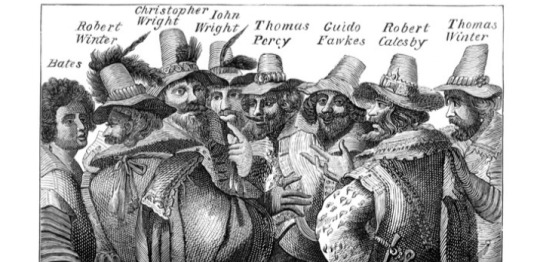
They experienced that quaint English method of execution, first experienced almost 300 years earlier by William ‘Braveheart’ Wallace.
They too were hanged, drawn, and quartered.
*Hanged, drawn and quartered:
Victims were dragged on a wooden hurdle behind a horse to the place of execution where they were first of all hanged, then their genitals were removed.
They were disembowelled and beheaded.
Their bodies were finally quartered, the severed pieces often displayed in public.
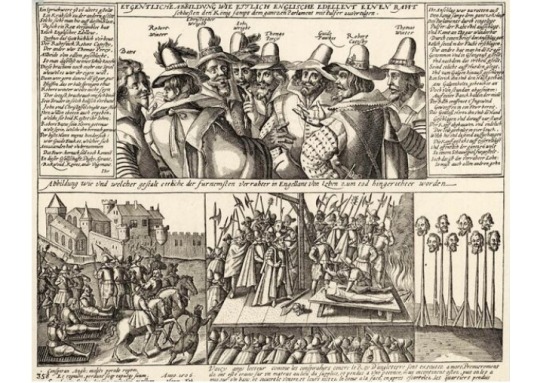
—
Guy Fawkes (13 April 1570 �� 31 January 1606), also known as Guido Fawkes while fighting for the Spanish, was a member of a group of provincial English Catholics involved in the failed Gunpowder Plot of 1605.
The Gunpowder Plot of 1605, in earlier centuries often called the Gunpowder Treason Plot or the Jesuit Treason, was an unsuccessful attempted regicide against King James I by a group of English Catholics led by Robert Catesby, who considered their actions attempted tyrannicide and who sought regime change in England after decades of religious persecution.
The plan was to blow up the House of Lords during the State Opening of Parliament on 5 November 1605, as the prelude to a popular revolt in the Midlands during which King James's nine-year-old daughter, Princess Elizabeth, was to be installed as the new head of state.
#Guy Fawkes#Guido Fawkes#Gunpowder Plot of 1605#Gunpowder Treason Plot#Jesuit Treason#King James I#Robert Catesby#5 November 1605#House of Lords#State Opening of Parliament#King Henry VIII#Queen Elizabeth I#King James I of England#Palace of Westminster#Lord Monteagle#Robert Cecil#Thomas Percy#Tower of London#High Treason
47 notes
·
View notes
Text
The surprise winner of last Wednesday’s election in the Netherlands is the longest-serving member of the Dutch House of Representatives: Geert Wilders. The far-right politician—known primarily for his anti-Islam radicalism, his pro-Putin views, and his hairdo—was first elected in 1998, but for years, he was shut out from the governing coalitions. Now, however, he holds the whip hand. His Party for Freedom (PVV) won 37 seats out of 150, up from 17 two years ago, dramatically outperforming the polls and placing well ahead of its closest competitor, the joint list of the Greens and the Labor Party (GL-PvdA).
But the path from there to becoming prime minister is a long and uncertain one.
In fact, the PVV had been subject to a cordon sanitaire ever since the fall of outgoing Prime Minister Mark Rutte’s first government in 2012, which it had supported (and which for that reason was colloquially referred to as Brown I, after the fascist brownshirts, instead of Rutte I). The PVV’s platform calls for bans on the Quran, on mosques, and on Islamic schools; a retraction of the Dutch king’s apology for slavery and the restoration of blackface at St. Nicholas celebrations; as well as an abolition of asylum and of free movement of workers within the European Union. Even by the standards of contemporary national conservatives, the platform is made up of a poisonous mix of heinous impulses.
Wilders maintained his presence in parliament, but his appeal and influence were limited while his caucus calcified, as it has now: Eight of the 10 longest-serving members in the new Dutch House are PVV members. But Wilders is the only member of the party as a legal entity, and its absolute ruler as a result, unbound by leadership elections or other concerns. The party does not organize conferences and such, and many of its incoming representatives do not know each other or their new colleagues. Combine that with the lack of outside options, thanks to the party’s reputation, for Wilders’s elected officials, and you end up with a predictable caucus of goons and misfits.
The explicit agreement among mainstream parties to exclude Wilders from governing coalitions came to an end this summer. Rutte brought down his own government over a minor disagreement with one of his coalition partners, the Christian Union, over family reunification rules for asylum recipients. Rutte’s successor as VVD party leader, Justice Minister Dilan Yesilgoz, then opened the door to cooperation with the PVV to rally voters who favor a right-wing government around her.
Wilders jumped at the opportunity and claimed that his priorities had shifted toward health care and economic anxiety. The Dutch media ecosystem complied and started referring to him as “Geert Milders.” As he started rising in the polls, especially after the conflict in Gaza broke out, Yesilgoz tried to walk back her earlier words.
Too little, too late: Voters preferred the original over the copy. In that sense, Wilders’s rise fits American political scientist Larry Bartels’s thesis—that democracy erodes from the top—almost perfectly.
While that is the immediate explanation for Wilders’s success, alarms bells about discontent among a large group of voters—and an openness to wild options—had been ringing for some time. Earlier this year, the agrarian-populist Farmer-Citizen Movement (BBB) became the largest party in the Dutch Senate after winning the provincial elections on its first try. In 2019, the radical-right conspiracy theorists of Forum for Democracy had similarly made their Senate debut as the largest party.
This impulse predates Wilders’s founding of the PVV in 2006: The right-populist Pim Fortuyn List broke through with 26 seats in 2002 after its eponymous founder was murdered by an animal rights activist. It also extends beyond voters open to Wilders’s message. On Wednesday, in addition to Wilders’s large gains, a new party (the New Social Contract) led by former Christian-Democrat Pieter Omtzigt, the second-most veteran member of the Dutch House, secured 20 seats mere months after its founding.
It is not obvious what the Dutch political class can or will plausibly do to address this discontent. It is not merely a thermostatic response to left-wing policy: Eternal prime minister Mark Rutte has mostly led fairly bland center-right governments since he entered office in 2010, while his predecessor was a Christian-Democrat.
In fact, there is a bloc of voters whose expressed wishes are so far out of line with majority opinion and with the domestic and international legal frameworks that the Netherlands has spent decades developing and promoting that they will not be satisfied by any realistic policy changes. These voters include the 50 percent of Wilders’s supporters who have been loyal to him for the past decade, and those who have stuck with the Forum for Democracy as even its own elected officials fled the party’s mix of antisemitism, anti-vaccine lunacy, racism, and love of Russian President Vladimir Putin. Like comparable voters in other countries, they are heavily male, lower-income, less likely to hold a college degree, and detached from social networks.
Disaffected voters outside of Wilders’ core supporters harbor a mix of concerns that include some where policy and governance could and should be improved—though that’s easier said than done. The nitrogen emission crisis that catapulted the BBB to its Senate victory requires difficult choices over land use—between agricultural activity, housing, infrastructure, and nature preservation—that simply need to be made instead of paralyzing the country for years.
Relatedly, housing policy in the Netherlands, as in the United States and elsewhere in the West, has been a disaster for decades. Limited construction in the face of ongoing urbanization, population growth, and ever decreasing household size has placed home ownership and even the ability to rent out of reach for far too many. Too many Dutch politicians, including mainstream ones, try to place the blame for these problems, which are of their own making, on migrants.
The Dutch system of capital income taxation is in flux after elements of it were struck down by the courts. Natural gas extraction in the northeast, suspended last month, caused earthquakes and significant damage: Many affected homeowners still await compensation. The child care benefit scandal that ended Rutte’s third government and made Omtzigt’s career ruined the lives of thousands of families, many of whom still await compensation as well.
But are these areas where a Wilders government would dramatically improve matters? Take the child care benefit scandal, the biggest political scandal in the Netherlands in recent years. The Dutch tax agency concluded it had targeted victimized families on the basis of national origin, donations to mosques, and “not looking Dutch.” It’s like putting U.S. Sen. Bob Menendez in charge of monitoring the Egyptian government’s human rights record.
On the international front, there are ways to reduce immigration at the margin: by forcing Dutch universities to offer more instruction in Dutch or by raising taxes on high-skilled immigrants. Such changes would be costly to institutions of higher learning, the Dutch knowledge economy, and industrial champions such as ASML, and I’m sure some of these same voters would complain about that in turn. The Netherlands could scale down its climate agenda somewhat, though significant aspects of it are managed at the EU level. And the country could return to its traditional position of budgetary hawkishness within the European Union after a brief excursion to Club Med—though Wilders’s platform, which calls for a lower pension age, reduced VAT, and more public health care spending, goes in the opposite direction.
But whether it’s immigration, EU membership, religious freedom, or Dutch support for Ukraine, there simply is no path forward for the dramatic policy shifts envisioned by Wilders and his ilk. There is no pro-Putin majority among Dutch MPs (or voters). The Netherlands is not going to leave the EU and reintroduce the guilder or convince NATO to expel Turkey. It is not going to abolish its representation in Ramallah because “it already has an embassy in Amman,” as the PVV stated in its election manifesto.
In fact, let’s not get ahead of ourselves: It is not at all obvious that there is a majority in the Dutch House that supports a government led by Wilders or one that his party participates in. The two indispensable parties for any majority are Omtzigt’s New Social Contract and, as has been the case for years now, the VVD.
During the campaign, Omtzigt suggested that he would not govern with Wilders; he predictably changed his tune this week. It would be somewhat ironic if partnerships with Wilders became the unifying thread of the political career of Omtzigt, a man who has long claimed to care deeply about religious freedom. Those who recall how American warriors for religious freedom responded to former U.S. President Donald Trump’s Muslim ban will not be shocked.
The VVD has adopted a trickier position. Despite triggering the election and opening the door to Wilders, it has now announced that it’s tuning out. It is unwilling to join any coalition—though it would be willing to support a minority right-wing government, presumably formed by PVV, the New Social Contract, and BBB. Such a government would effectively be Rutte I in reverse, with the VVD and the PVV swapping places and the New Social Contract and BBB taking the place of the Christian-Democratic party that Omtzigt was then a part of.
Variations will surely be considered, and I imagine that Yesilgoz would happily join a coalition if she gets to be prime minister. Wilders is responsible for selecting a so-called “scout” to explore the possibilities. His first choice was forced to resign when news broke that Utrecht University, the scout’s former employer, had filed charges of fraud and bribery against him. The new beacon of hope for concerned citizens is Ronald Plasterk, a former education and home affairs minister for the Labor Party who has drifted to the right in recent years.
The alternative to a right-wing coalition—off the table while Wilders has the initiative—would be a broad centrist coalition in which the VVD and New Social Contract are joined by the GL-PvdA and either the liberal Democrats 66 party or the BBB. But even consideration of that option is unlikely to happen before 2024.
This route would not be a very satisfying outcome to many New Social Contract and VVD voters. At the same time, it would avoid not just Wilders, but also a coalition featuring two entirely new parties, including many inexperienced and unvetted PVV MPs. For the outgoing prime minister, who has set his sights on a leadership role at NATO or the European Commission, it would surely constitute a more attractive legacy. And at a time of geopolitical upheaval, it might be the responsible choice.
Though the size of Wilders’ win came as a major surprise, these two coalition options were basically already on the table based on preelection polling. Ironically, a shift to the right may well be less likely now than if Wilders had won fewer seats. As the leader of the largest party, he would traditionally become prime minister. To his potential coalition partners, that may be a bridge too far in a way that a less dominant role might not have been.
But regardless of the eventual outcome and whatever else may motivate his voters, Wilders’s victory is first and foremost a message of intense hatred toward the Netherlands’ ethnic and religious minorities as well as its immigrant population. The legitimation of Wilders’s open bigotry and the willingness of millions of Dutch voters to tell their neighbors and co-workers that they find their mere existence odious are, well, not great.
11 notes
·
View notes
Text
What happened in The Netherlands?
The Dutch elections have created a shockwave in The Netherlands, Europa and beyond. Rightfully so, because the results of the elections were beyond shocking.
For those who wonder what happened, I'd like to try and explain it. First of all, elections in The Netherlands are not managed by districts. All votes count the same and each party that would get 1 seat (out of 150) or more earns a place in parliament.
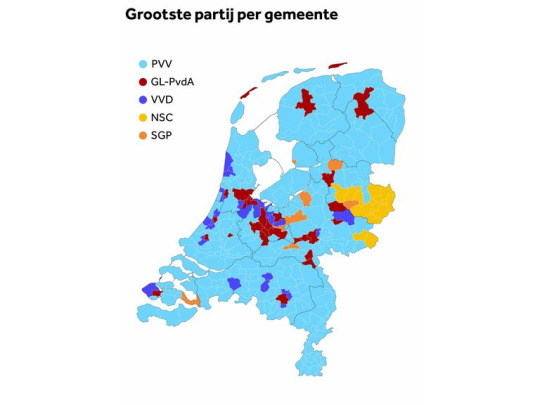
This is the second electoral shockwave within 1 year in The Netherlands. Earlier in March, when the provincial parliaments were elected, the 'BBB' won: the party for farmers.
This time the 'PVV' won: the Party For Freedom. All the blue areas were the areas where the PVV won, the red areas had the most votes for the combined Labour/Greens-list, blue is the conservative-liberal party, yellow is a center-right party and orange is a very conservative Christian party, that only won 3 seats, but did win some municipalities.
What does the PVV stand for?
The PVV is a conservative party, against immigration, climate action, lgbti-people and mainly the islam. They are against the EU. The party is seen as far-right, but during campaigns they also focus on left-wing subjects, such as healthcare and salaries.
The PVV was founded in 2006, by Geert Wilders. In 17 years, they never entered the government, though they did carry responsibility between 2010 and 2012, when they supported a conservative right-wing government, that ended because Wilders did not support them anymore.
The PVV, despite the name, has just 1 member: Geert Wilders himself. The party is notorious for having controversy about people on their list. They had a man who peed in a mailbox, someone who was accused of forcing his wife to have sex with his security and Wilders himself was convicted for racist remarks, when he made a crow cheer they wanted less Moroccan people in The Netherlands.
Wilders was also awarded a 'friend of Russia' price by Putin, and despite the fact that the PVV says to support Ukraine, they are against real support for the Ukrainian people.

All the above makes it hard for me to understand why people would vote for his party. Still, there must be reasons. Plenty of people that I know voted for the PVV, and very few of them are racists. Then why would they vote for a racist party?
I guess the answer is, that a lot of people don't feel that the welfare that the general Dutch society has, has landed at the right places. Like in the US, there is a lot in inequality in The Netherlands.
So currently, some parties are negotiating a new government. The PVV, the liberal-conservative VVD, the center-conservative NSC and the populistic farmers party BBB. They absolutely don't think the same about climate, migration or even basic human rights. Still, it currently seems to where were standing, even if these negotiations are already proving to be one of the longest in Dutch history. If this coalition will happen, it will be a dark time for lgbti+ people, for the climate or for migrants. Racism is growing in The Netherlands and it deeply saddens me.
Already, transcare, nature resoration and a growth of minimum wage have been put on hold. I could mention many more things. But we will need to see what happens. A sad time for sure.
5 notes
·
View notes
Photo
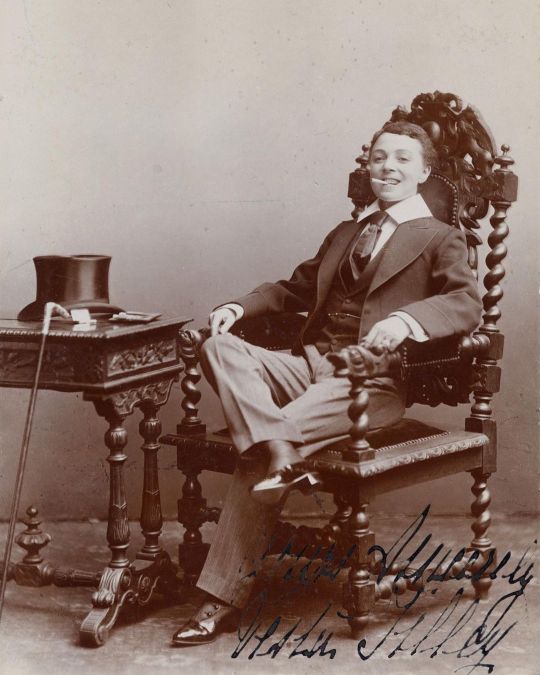
🔸 Matilda Alice Powles (13 May 1864 – 16 September 1952) was an English music hall performer. She adopted the stage name Vesta Tilley and became one of the best-known male impersonators of her era. Her career lasted from 1869 until 1920. Starting in provincial theatres with her father as manager, she performed her first season in London in 1874. She typically performed as a dandy or fop, also playing other roles. She found additional success as a principal boy in pantomime. By the 1890s, Tilley was England's highest earning woman. She was also a star in the vaudeville circuit in the United States, touring a total of six times. She married Walter de Frece, a theatre impresario who became her new manager and songwriter. At a Royal Command Performance in 1912, she scandalised Queen Mary because she was wearing trousers. During the First World War she was known as "England’s greatest recruiting sergeant" since she sang patriotic songs dressed in khaki fatigues like a soldier and promoted enlistment drives. Becoming Lady de Frece in 1919, she decided to retire and made a year-long farewell tour from which all profits went to children's hospitals. Her last performance was in 1920 at the Coliseum Theatre, London. She then supported her husband when he became a Member of Parliament and later retired with him to Monte Carlo. She died in 1952 on a visit to London and is buried at Putney Vale Cemetery. Her life story was commemorated in the 1957 film After the Ball in which she was portrayed by Pat Kirkwood. #victorianchaps #victorian #edwardian #vestatilley #vaudeville #theatre #goodolddays #dandy #oldphoto #retro #vintage nostalgia #1870s #1880s #1890s #1900s #1910s #pastlives https://www.instagram.com/p/CjclkwOAwcp/?igshid=NGJjMDIxMWI=
#victorianchaps#victorian#edwardian#vestatilley#vaudeville#theatre#goodolddays#dandy#oldphoto#retro#vintage#1870s#1880s#1890s#1900s#1910s#pastlives
86 notes
·
View notes
Note
you've mentioned places like great lakes and new westminster. are these states or provinces, or just general regions? how is sunderland divided administratively?
Yes, hello, these are provinces and Sunderland has ten of them! They look like this (roughly, it's a work in progress)

The ten provinces are:
Alexandria, Algonquin, Cheyenne, Danforth, Great Lakes, Iroquois, Lakota, Missoria, and New Westminster
Each province is represented by a provincial government and they are considered to have shared sovereignty with the federal government. Each province has a Governor-General, who represents the Crown aka Louis V. Each province has a certain amount of MPs (Members of Parliament) who sit in either the House of Commons (lower chamber) or the Senate (upper chamber). MPs represent the legislative interests of their provinces and municipalities at the federal level. There is a fixed number of twenty senators (two from each province), who are appointed by the King on the advice of his prime minister, while members of the House of Commons are elected directly in federal elections, with the number of MPs depending on the population of their province, the larger the province the more seats they have in the House of Commons.
In Sunderland, you don't vote for the prime minister directly, you vote for them through your MPs. So, if the potential prime minister (the party leader) belongs to the Liberal party, you vote for the Liberal MP representing your area, if that Liberal MP wins they have a seat in the House of Commons. If a majority of the MPs in the House are of a certain party (the main two being Liberals and Tory Conservatives), their party leader becomes Prime Minister with a majority government. If a party wins the most seats but fails to hold a majority, this is called a minority government and the ruling party has less absolute authority and will have to coalition-build with other parties in order to get things done. So, it's extremely important that the Prime Minister and his Ministers are supported by their MPs in the House of Commons, this is something Sunderland's current prime minister is struggling with. MPs can resign, retire, switch parties, or die on a whim, so the amount of power a government has can fluctuate.
The Senate is more of the wild-west as Louis is free to appoint to whoever he wishes for whatever reason he wants (on the advice of the prime minister, but he can ignore the advice). The general rule is that these people have to be of noteworthy public standing, but they don't have to be politicians. They can be activists, lawyers, civil servants, etc. If the King tries to appoint a friend or a family member, nothing but public outrage can stop him. So, naturally, Louis doesn't appoint friends or family and has grilled James and later Nicholas on this being something you should never do as King. Louis's Daddy James II didn't have the same restraint. . . Nor did King Nicholas (removing the leftists meant sacking the senate against them) . . . Or King George who fought tooth and nail to have his moronic son-in-law appointed to the Senate in 1898 . . . but it's not a corrupt system at all, I swear . . .
The Senate has the job of approving the potential laws (bills) passed to them by the House of Commons, in short: if they dislike it, they send it back or veto it, if they like it, they'll hand it over the Louis for royal assent. Believe it or not, the fact that there is an unelected body, that serves until the age of SIXTY-FIVE, picking and choosing what laws get greenlit has caused SCANDALS, with the protests happening in this post being triggered by the Senate rejecting an affordable housing bill forwarded by the Liberals in the House.
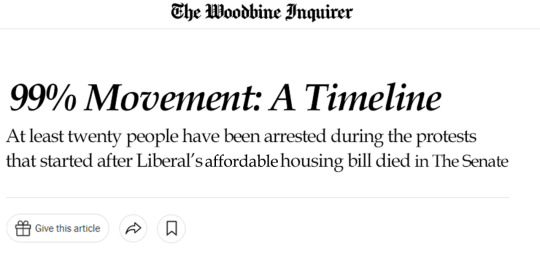
Until 1999, those appointed to the Senate were given a title of nobility, typically an Earldom or a Dukedom if The King thinks you're a really good boy. The families of Irene and Tatiana are descended from prominent Senators, this is where their family titles originated from. This tradition ended when the first woman was appointed to the Senate in 1999, since women can't inherit noble titles, Louis stopped the practice altogether, instead of . . .y'know, just getting Parliament to allow women the ability to hold noble titles suo jure. Louis can technically still hand out noble titles, but he informally agreed to stop granting titles to non-family members. People at the time viewed this as him becoming more egalitarian and progressive for the new millennia, but in reality, he was just keeping his crop of aristocrat ass-likers more exclusive. So, now your senators aren't literal dukes and earls . . . yay, progress?
Finally: The "commander-in-chief" of a province is called the premier. Think of him like a governor in the United States. These guys are elected through provincial elections and they form their own legislative bodies to handle provincial legislation (healthcare, education, etc.). They operate largely independently from the federal government and have historically resisted federal micro-management.
If you're familiar with American geography or history, you'll know that the provinces have Indigenous names (Cheyenne, Lakota, Missouria, Iroquois, Algonquin) and others are named after royalty (Alexandria and Louisia) and prominent figures/locations (New Westminster, Danforth) . . . the implications of these names say a lot about Sunderland's history.
Hopefully, I'll be able to update my map soon, hope you enjoyed the political lesson.
10 notes
·
View notes
Text

"REMEMBER, boys?" Windsor Star. July 29, 1943. Page 14.
----
This is the day you marched to the City Hall - As I stood then I stand now!
VOTE AUGUST 4th FOR
ART REAUME
"A FRIEND OF LABOR"
For M.P.P. Windsor-Sandwich
#member of provincial parliament#election campaign#election poster#ontario politics#windsor#provincial election#canada during world war 2
0 notes
Text
Affordable housing units open in Charlottetown, Abegweit First Nation
Two new affordable housing projects in Prince Edward Island officially opened on Thursday.
One of the projects is a modular four-storey building on Fitzroy Street in Charlottetown by the Canadian Mental Health Association of PEI. It contains 28 affordable studios and one-bedroom apartments for people dealing with mental health and addiction issues.
Fifteen of the units are specifically meant for women.
The project received close to $7.9 million from the federal government through the Rapid Housing Initiative (RHI). The P.E.I. government also contributed $2.8 million over a 20-year period in annual operating grants.
“We are providing a chance to members of our community who are struggling with mental health and addictions issues to bring a positive change to their lives and to the community. Having access to safe, supportive and affordable homes is key to their recovery,” said Sean Casey, Member of Parliament for Charlottetownin a release.
Casey also announced Thursday the completion of a five-unit affordable housing complex on the lands of the Abegweit First Nation.
The project received $1.35 million through the RHI and will serve the Mi’Kmaq community and prioritize women and their children.
The housing complex also received provincial energy efficiency funding.
The chief of Abegweit First Nation says the lack of affordable and healthy housing is a major issue in the community.
"I am extremely proud that Abegweit's own construction team built five new, healthy and energy efficient homes in our community through the Rapid Housing Initiative. Now, several young families, who struggled to find and afford shelter off reserve, can move back home,” said Chief Junior Gould in the release. “Having these families back in the community will improve the socioeconomic wellbeing of our community and give hope to our young and growing membership that solutions are on the way."
from CTV News - Atlantic https://ift.tt/B9ai0jA
67 notes
·
View notes
Text
Chad Belanger was left with a broken neck, ribs, collarbone and sternum, a bruised heart and lungs, a concussion and PTSD following a crash caused by a truck that crossed a solid double yellow line to pass another vehicle in northern Ontario.
His New Democratic member of provincial parliament, Guy Bourgouin, was surprised – as are many other Ontarians that Bourgouin has heard from – to learn that it is not actually illegal to cross double lines when overtaking another vehicle.
Continue Reading
Tagging @politicsofcanada
81 notes
·
View notes
Text

Why It’s so Hard to Actually Work in Shared Offices
WeWork offers freelancers a chic workspace and beer on tap—but are people productive?
During my final week at WeWork, the building held a party. All six floors were crowded with tenants and guests eagerly drinking WeWork margaritas and awkwardly swaying to Drake. A young, blond exec cut the music for a moment to stand up on a riser and say how much she loved fulfilling the company’s mission. “This is more like a bar or a club than a workspace,” said the local member of provincial parliament, taking in the scene. Entrepreneurial caterers handed out business cards along with their miniature cups of artisanal pho. This party was work, of course, just like work was always a party. I ate a plate of duck-ragù pasta served on a pillow of cauliflower foam, drank a craft beer called Food Truck, and felt an inexplicable and totally disproportionate sense of despair.
Read more at thewalrus.ca.
Illustration by Josh Holinaty (holinaty.com)
4 notes
·
View notes
Photo

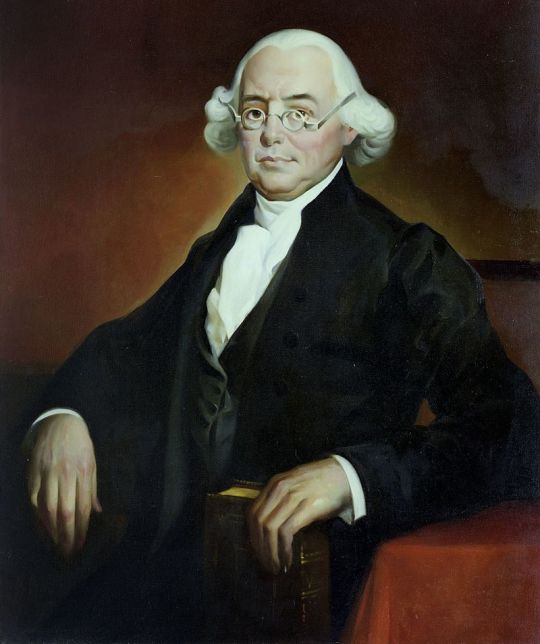
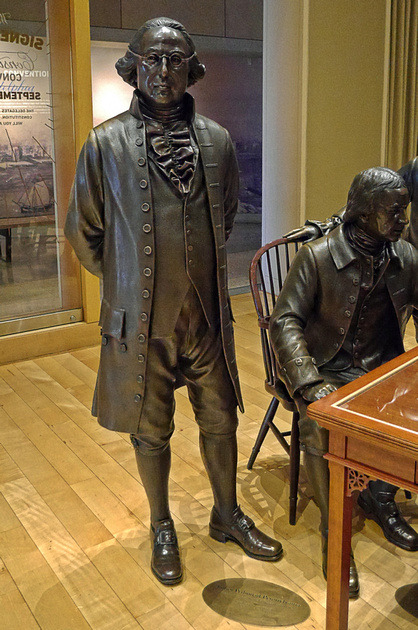
August 21st 1798 saw the death of James Wilson, one of the Founding Fathers of the United States and a signatory of the United States Declaration of Independence and the United States Constitution.
Wilson was born on September 14th 1742 at Carskerdo,Farm, near Ceres, the fourth of the seven children of Alison Landall and William Wilson, a Presbyterian farming family.
He attended the Universities of St.Andrews, Glasgow, and Edinburgh. He never finished his studies, as he sailed for the New World in 1765. Aided by some letters of introduction, he became a tutor with the College of Philadelphia. He received an honorary M.A. shortly thereafter. In November 1767, he was admitted to the bar, and thus pursuing his recent-born interest in the law. He set up his own practice in Reading in the year 1768. He was quite successful, as he handled nearly half of the cases charged in the country court.
In 1774, he wrote an essay with the title:“ Considerations on the Nature and Extent of the Legislative Authority of the British Government.” He distributed this article among the members of the First Continental Congress. Within those pages, he set down a number of arguments which severely challenged the parliamentary authority over America. In the final conclusion of this manuscript, he states that Parliament had no power whatsoever over the American colonies. Although he accepted in some ways the power of the Monarch, he would not subject himself to the whims of Parliament, in which the colonies had no representation. His manuscript was read in both America and England, and created quite a stir. He was one of the first to ever voice these opinions in a sensible, well-argumented manner.
As a member of the Pennsylvanian Provincial Congress, he made a passionate speech about the possibility of an unconstitutional act made by Parliament. Judicial Review, the American system of checking governmental acts with the Constitution, was on its way.
In the same year, 1775, he signed the Declaration of Independence as a member of the Second Continental Congress. According to sources, it seems he hesitated at first, but signed anyway. This was due to the fact that he was a representative of the Middle States, where opinions about independence differed. But by signing the Declaration, he broke the deadlock the Pennsylvania delegation was in. His signature made sure Pennsylvania voted for independence.
During the next years he was an occasional member of the Continental Congress, and was present at the Constitutional Convention of 1787, which assembled with the purpose of drafting The Constitution of the United States of America. Here he was a very influential figure, whose ideas where heavily incorporated in one of the most important documents in history. Thus the Constitution bears his signature.
In 1789, he became a professor of law at the University of Pennsylvania, and in the same year was appointed associate justice of the Supreme Court.
It’s not all good news on this Scottish born American though, he was a terrible businessman and he took flight to escape imprisonment for debt. Eventually his $197,000 debt sent him to jail twice, but only for short stays. This didn’t seem to have affected his duties as a judge though as he continued on the Federal judicial circuit despite his misdemeanors.
In 1798, James Wilson suffered a bout of malaria and then died of a stroke at the age of 55, he was buried in the Johnston cemetery on Hayes Plantation near Edenton, but was later reinterned in 1906 at Christ Churchyard, Philadelphia.
11 notes
·
View notes
Text
✽Haydi gençler Newroz alanlarına.
Twitter üzerinden sayın Ferhat Encü(+foto)
✽Come on young people to the Newroz fields.
Ferhat Encü a Kurdish politician and former member of the Turkish Parliament in the Sirnak Province, HDP Istanbul provincial co-chairperson(+photo)
✽ "さあ、若者たちよ!ネウロズの広場へ"
トルコの親クルド派政党HDPイスタンブル地区フェルハト・エンジュ共同代表より(画像とも)

2 notes
·
View notes
Video
youtube
Yes “even in Canada”
On August 5th, I was woken up by London Police Services, pointing an assault rifle in my face in my home. I was later told that at 6 AM, that morning, an email impersonating me was sent to every city counselor in London, Ontario stating that I killed my mother, I have an illegal firearm, and I plan to go to city hall and shoot every cisgender person I see. I was shown the email while I was being interrogated at the station and still in police custody.
xvd
While the emails were riddled with grammatical errors and read more like a troll than something I would sincerely say, the police took it seriously. Not only that, the email said my name was Clara Sorrenti, but also stated what my deadname was. It was an obvious attempt to make the police humiliate me. The police referred to me during the arrest by my deadname. I was booked in the station under my deadname. The police, when talking to my mother, called me “her son”.
This is despite the fact that I have run for political office both as a Member of Parliament and a Member of Provincial Parliament under my name, Clara Sorrenti. I legally changed my name over ten years ago. The fact that a fake email – the one that made police officers point an assault rifle at me – led to London Police Services booking me under my deadname reveals the prejudice that many police have towards transgender people. This is despite the fact that the email contained my real name before ever mentioning my deadname.
*show property bags* This is one of the property bags returned to me after I was released from custody. The property bags returned to me say Roberts on them. Roberts was my last name until I legally changed my name first to Kaylie Sorrenti on January 25th 2012 and then later to Clara Sorrenti on March 7th, 2018. When I changed my name, I took my mother’s maiden name. My last name has not been Roberts for over ten years, and the only reason it was on these bags is because I was booked under my deadname.
12 notes
·
View notes